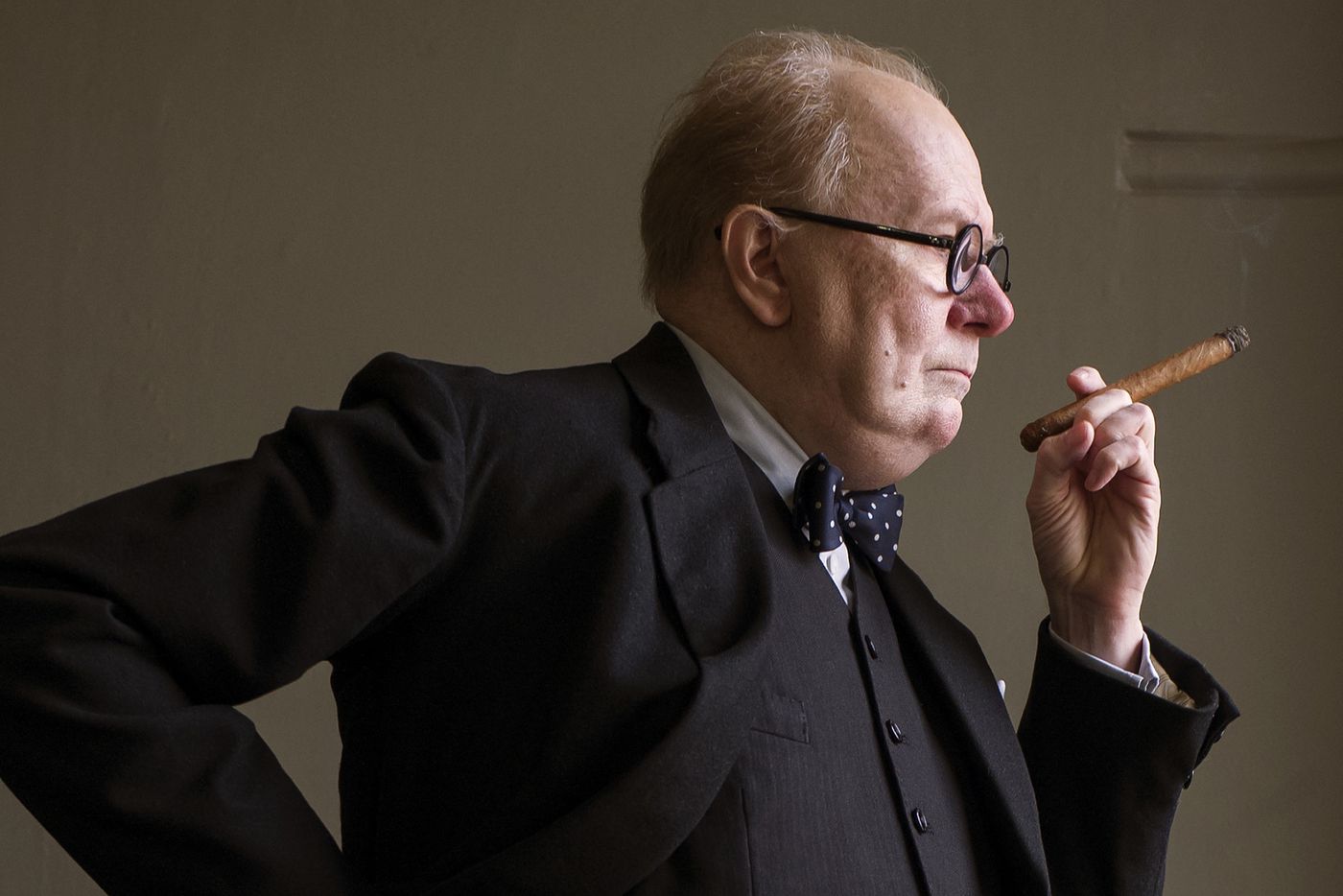chevron_left
-
play_arrow
NGradio So good... like you
Flash and volume likely to defeat subtlety in this year’s acting Oscar races

share
close
Late in the World War II drama “Darkest Hour,” Winston Churchill — played, in case you hadn’t heard, by Gary Oldman — delivers his famous “We shall fight on the beaches” speech in the House of Commons, a piece of oration so rousing that it brings his listeners to their feet.
For a moment ripped from the pages of history, the scene feels curiously prophetic: less a blast from the past than a dress rehearsal for Oscar night.
If he wins the Academy Award for lead actor on March 4, as he is widely expected to do, Oldman will likely earn another standing ovation, this time while wearing a tuxedo rather than a fat suit and prosthetics. An upset might still be brewing — as last year’s epic envelope snafu reminds us, anything can happen — but any other outcome would have to be reckoned a major surprise.
The same goes for Frances McDormand, Sam Rockwell and Allison Janney, heavily favored to win the Oscars for lead actress, supporting actor and supporting actress, respectively. All four have already triumphed at the Critics’ Choice Awards, the Golden Globes, the Screen Actors Guild Awards and the British Academy Film Awards, a rare confluence of press and industry opinion that is almost certain to repeat itself once more at the Oscars, to much applause if also a wearying sense of anticlimax.
Not everyone will find it wearying, of course. Those who believe that the year’s most indelible feats of big-screen acting can be found in “Darkest Hour,” “I, Tonya” and “Three Billboards Outside Ebbing, Missouri” will join the applause without hesitation. And even those who don’t might be heartened by the recognition of veterans as respected as Oldman, McDormand, Rockwell and Janney (even if by this point they are starting to sound like partners at the world’s most boringly successful law firm).
Is it petty, then, to long for an upset or two? To wish that those prior awards ceremonies had supplied a less unanimous, more interesting set of responses? Was there not a voting body that felt inclined to shed some well-deserved light on, say, Sally Hawkins for “The Shape of Water,” Mary J. Blige for “Mudbound” or Willem Dafoe for “The Florida Project”? Was it ageism that kept them from bestowing a prize on either of the two most exciting discoveries of the year, Timothée Chalamet in “Call Me by Your Name” and Daniel Kaluuya in “Get Out”?
Every awards season tends to converge toward predictable outcomes. Even still, the near-unprecedented degree to which the same four actors have steamrolled their competition strikes me as an unusually misguided example of the consensus machine working overtime. It’s not that the performances given by Oldman, McDormand, Rockwell and Janney — wonderful actors all, it scarcely needs mentioning — are without their individual merits. But lauded together, over and over again, they amount to a skewed, lazy and finally unrepresentative sampling of what was an exceptionally rich and varied year in movie acting.

Allison Janney in a scene from the movie “I, Tonya.” (Neon via AP)
Is it pure coincidence that McDormand, Janney, Oldman and Rockwell all played such fierce, stubborn, self-isolating characters? Fictional or fact-based, these men and women always seem at war with the world around them — none more literally than Oldman’s Churchill, bickering with his allies, seething at his rivals and ultimately defying Adolf Hitler himself, all while giving a master class in scenery chewing to make the Blitz look restrained by comparison.
The stakes may be less world-shattering in “I, Tonya,” but Janney’s LaVona Golden — the perpetual devil on the shoulder of her celebrity daughter, Tonya Harding — seems to inhabit her own zone of angry solitude. She’s a self-styled truth teller in a world overrun by bullies and phonies. Something similar could be said of McDormand’s Mildred Hayes and Rockwell’s Officer Dixon in “Three Billboards Outside Ebbing, Missouri,” two unfriendly small-town outcasts and staunch adversaries who reluctantly join forces in their bitter pursuit of justice.
The cumulative ferocity of these performances is worth noting, in part, because it plays into the Academy of Motion Picture Arts and Sciences’ long-standing tendency to mistake aggressiveness for depth, to equate the showiest, most arresting and physically transformative acting with the best. And sometimes, of course, the equation is accurate. The academy’s honor roll, to say nothing of cinema history, would be significantly poorer if Robert De Niro hadn’t bulked up to play Jake LaMotta, or if Natalie Portman had never strapped on a pair of toe shoes.
But to their credit, academy voters have also proved admirably willing to resist those more-is-more impulses, especially in recent years. Think of Mahershala Ali winning the supporting actor Oscar for his quietly transcendent performance in “Moonlight,” or Patricia Arquette earning best supporting actress for her moving, flash-free work in “Boyhood.” The academy will always love its dazzling star turns and its disease-of-the-week histrionics, but it clearly also has voters who are willing to appreciate nuance and avoid the obvious.
This year there seems to be no avoiding Janney, whose acidly funny performance might be the best thing about “I, Tonya” but is far from the best thing nominated for best supporting actress. Janney makes a memorable Gorgon, to be sure, but she also reduces LaVona to a cardboard grotesque, the kind of sideshow that can’t hold a candle to Laurie Metcalf’s infinitely more layered portrait of a tough-loving mom in “Lady Bird.”
There also seems to be no avoiding the “Three Billboards” duo of McDormand and Rockwell, whose joint winning streak over the last few months is an unmistakable if excessive salute to the actors’ rough-hewn chemistry. It also shows just how little the industry seems to care about the critical sentiment that has built up against Martin McDonagh’s film in recent months, much of it directed specifically at Rockwell’s Dixon, an ill-tempered white police officer with a fondness for beating up black suspects.
As someone who admires the movie with a few billboard-sized reservations, I’d say the open-ended question of whether the racist cop is ultimately “redeemed” makes the story more provocative and thornily human rather than less. If anything, the most glaring flaw in McDonagh’s screenplay — the callousness with which it reduces its black characters’ suffering to a mere plot point — is productively complicated by Rockwell’s idiot-bad-boy swagger. He makes Dixon both a repellent moron and an insidious charmer; if he’s someone you love to hate, he’s also someone you hate to love.
In some ways I’m more persuaded by Dixon’s struggle to turn over a new leaf than I am by the fiery crusade of Mildred Hayes, a grieving mother whom McDormand invests with the kind of scene-stealing ferocity that will doubtless pummel more than a few academy members into submission: Vote for me, bitches! Making like a 21st century Rosie the Riveter in her badass bandanna and jumpsuit, Mildred may be an avenging dark angel, but she’s really a consummate tell-off artist, someone with a custom-tailored diatribe for anyone who dares stand in her way.

Sam Rockwell and Frances McDormand in a scene from “Three Billboards Outside Ebbing, Missouri.” (Merrick Morton / AP)
To these ears, though, even McDormand’s nastiest zingers too often come off as strained, self-satisfied shtick — not something you could say about her marvelous comic performance in “Fargo,” which won her a lead actress Oscar 21 years ago. By far her best moments in “Three Billboards” are those in which Mildred’s steely composure erodes, when she’s suddenly overwhelmed by a spasm of grief, regret, compassion or fear. (Tellingly, many of those moments take place opposite Woody Harrelson, whose turn as a cancer-stricken police chief is easily the movie’s best.) But these humanizing blips don’t always well up persuasively from beneath Mildred’s rage; they feel programmed, tonally and emotionally at odds with that trash-talking surface.
Perhaps most of all this year, there seems to be no avoiding Oldman and the admittedly remarkable metamorphosis he undergoes in “Darkest Hour.” It’s astonishing to see the actor who once played the thin, gangly Sid Vicious now fully inhabiting Churchill’s portly figure, outsized persona and heroic legacy. Oldman doesn’t give a bad performance; he gives a grandiose one, impeccably scaled to the ham-fisted proportions of the dramatic vehicle at hand.
“He mobilized the English language and sent it into battle,” one of Churchill’s rivals says with grudging admiration after that aforementioned speech. It’s an unwittingly apt summary of a performance type that tends to excite awards voters, in which words are all but marshaled into action, pressed in service of grandstanding speeches and lump-in-the-throat line readings.
It’s probably telling that I can’t recall much of Oldman’s dialogue from “Tinker, Tailor, Soldier, Spy” (2011), in which he played John le Carré’s memorable antihero George Smiley — a fictional creation, to be sure, but no less determined a steward of his nation’s place in history than Churchill. It wasn’t the kind of performance that bellowed its brilliance to the rafters. Oldman worked at his own seductively measured pace, drawing the viewer in a little more with every cryptic gaze. The effect of it was hypnotic; by the end he had all but seeped into your bloodstream.
The result was too subtle a showcase to earn Oldman the kinds of accolades that are now falling almost carelessly into his lap. But it remains the richer of his two Oscar-nominated turns by far, and I suspect it will serve as a useful reminder: The best performances often defy consensus as well as convention, especially when an actor’s darkest hour is too easily mistaken for his finest.
Source: latimes.com
Written by: New Generation Radio
Rate it
Similar posts
ΔΗΜΟΦΙΛΗ ΑΡΘΡΑ
COPYRIGHT 2020. NGRADIO
We use cookies on our website to give you the most relevant experience by remembering your preferences and repeat visits. By clicking “Accept”, you consent to the use of ALL the cookies.
Manage consent
Privacy Overview
This website uses cookies to improve your experience while you navigate through the website. Out of these, the cookies that are categorized as necessary are stored on your browser as they are essential for the working of basic functionalities of the website. We also use third-party cookies that help us analyze and understand how you use this website. These cookies will be stored in your browser only with your consent. You also have the option to opt-out of these cookies. But opting out of some of these cookies may affect your browsing experience.
Necessary cookies are absolutely essential for the website to function properly. This category only includes cookies that ensures basic functionalities and security features of the website. These cookies do not store any personal information.
Any cookies that may not be particularly necessary for the website to function and is used specifically to collect user personal data via analytics, ads, other embedded contents are termed as non-necessary cookies. It is mandatory to procure user consent prior to running these cookies on your website.
0%
Suport Us!




















Post comments (0)